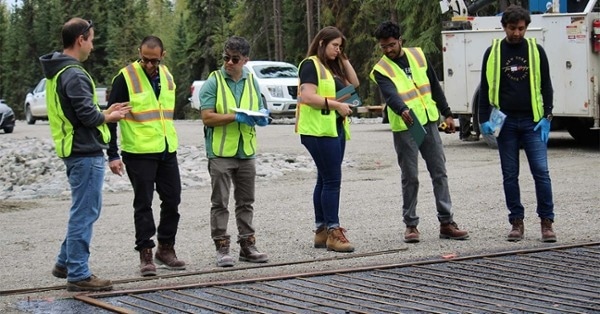Researchers at Rowan University’s Center for Research & Education in Advanced Transportation Engineering Systems (CREATES) are in the process of developing an electrically heated pavement system. This system aims to be both efficient and cost-effective, intended for the purpose of melting snow and ice on roadways and airfields.

From left to right: Ian Sennstrom, Ayman Ali, Shahriar Abubakri, Caitlin Purdy, Ashith Marath, and Ahmed Saidi, all part of Rowan University's Center for Research & Education in Advanced Transportation Engineering Systems, inspect the installation of a testing strip for a system designed to deice pavement in Arctic regions. Image Credit: Rowan University
The outcomes from extensive tests performed at Rowan’s testing facility in southern New Jersey have been recently published in the Transportation Research Record. This scientific journal is published by the Transportation Research Board, a division of The National Academies of Sciences, Engineering, and Medicine.
Carried out during the winters of 2021 and 2022, the study involved the comparison of three pavement test strips. One was a traditional pavement strip, while the other two were electrically heated strips. These heated strips were constructed using either a conductive asphalt binder or a modified, high-performance thin overlay mixture containing graphite and carbon fibers.
Installation of both electrically heated pavement test strips involved placing them over steel electrodes, spaced either six or 12 inches apart, and then connecting them to a power source.
The electrical data obtained from the heated test strips indicated that the strip incorporating the conductive high-performance overlay mixture needed approximately 50% less power to elevate the surface temperature above freezing compared to the strip utilizing the conductive asphalt binder.
We are dedicated to advancing this electrically heated pavement system to make it a viable and sustainable solution for winter weather maintenance. By refining these methodologies, we aim to contribute to safer and more efficient travel, not just in New Jersey, but potentially across regions experiencing severe winter challenges.
Yusuf Mehta PhD, Director and Principal Investigator, Center for Research & Education in Advanced Transportation Engineering Systems, Rowan University
Ayman Ali Ph.D., CREATES Associate Director and the project’s Co-Principal Investigator, says that the subsequent phase of the study will be conducted at full scale under extreme cold weather conditions at an Arctic testing facility operated by the US Army Corps of Engineers.
Successful application of the electrically heated pavement systems will help the Army and other Department of Defense agencies build safe, horizontal infrastructure, such as airfields and runways. We expect this design will reduce delays in air operations in the Arctic and subarctic regions.
Ayman Ali PhD, Associate Director and Co-Principal Investigator, Center for Research & Education in Advanced Transportation Engineering Systems, Rowan University
The research is supported through a grant from the US Army Corps of Engineers, the Engineer Research and Development Center (ERDC), and the Cold Regions Research Engineering Laboratory (CRREL). The lead author of the study is Ashith Marath, a civil engineering doctoral student. Marath is supervised by Ali, Mehta, and Ahmed Saidi, PhD, a CREATES research fellow.
Journal Reference
Marath, A., et al. (2023). Full-Scale Evaluation of Electrically Conductive Asphalt Pavements for Deicing Applications. Transportation Research Record. doi/abs/10.1177/03611981231190636